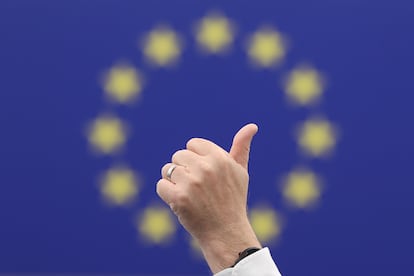The EU agrees to hit US with counter-tariffs of 25% on wide range of products
This is the first wave of retaliatory levies approved by member states against Washington’s tariffs on European goods. ‘Be cool! Everything is going to work out well,’ posted Donald Trump afterwards


The European Union has delivered its first blow against the United States in the trade war started by Washington. On Wednesday, member states backed the proposal made by the EU’s executive organ, the European Commission, to impose 25% tariffs on U.S. goods. This initial response has been nearly a month in the making and matches the raise on steel and aluminum that the Donald Trump administration announced in early March.
“The EU considers US tariffs unjustified and damaging, causing economic harm to both sides, as well as the global economy. The EU has stated its clear preference to find negotiated outcomes with the US, which would be balanced and mutually beneficial,” the European Commission said in a statement, following the vote.
Unlike China or Canada, which responded swiftly to the U.S. economic aggression, the European Union has taken its time to retaliate. This delay was due to a mix of necessity and strategy. It had to delay its response out of necessity because while the European Commission holds primary authority over trade matters, it must maintain unity and forge a position that brings together all or most member states — a process that takes time. Over the past month, Brussels has engaged in intense negotiations with the member states, ultimately securing the support of every one except Hungary, which has increasingly finds itself out of step with the EU’s broader consensus on various issues (foreign policy, Ukraine, budgets, rule of law...).
The delay was also strategic, as Brussels aims to find a negotiated resolution to the conflict, and does not want to give the United States any excuse to avoid negotiations. However, in reality, a sense of realism — and even pessimism — has begun to take hold in EU circles. But Brussels has issued an unwavering warning: it is prepared to strike without hesitation and, if negotiations fail, impose tariffs on the trade of services.
🚨EU COMMISSION STATEMENT🚨
— Olof Gill (@olofgill) April 9, 2025
EU Member States have voted in favour of @EU_Commission proposal to introduce trade countermeasures against the US.
They can be suspended at any time should US agree to a fair & balanced negotiated outcome.
Full statement👇https://t.co/TJTOft3YSy
The trade counselors from EU member states voted on two lists of U.S. products to be hit with tariffs, mostly set at 25%, and in some cases, 10%. Initially, the package was valued at approximately €22.5 billion, but after extensive negotiations, it was reduced to just under €20.9 billion. The tariffs will be implemented in phases: on April 15, sanctions will target a first group of imports worth €3.9 billion; a month later, a second package of €13.5 billion will come into effect; and finally, a smaller round of sanctions, totaling €3.5 billion, will follow.
This move marks a departure from the “euro-for-euro, dollar-for-dollar” principle that was initially proposed in response to the U.S. trade actions. However, it ensures that Italy — a key EU member whose leader, Giorgia Meloni, shares a close rapport with Donald Trump — will remain aligned with the EU’s strategy. Trump’s 25% tariffs on steel and aluminum, imposed in March, were aimed at imports worth €26 billion. Ultimately, following discussions with the member states, the European Commission made some concessions to maintain unity. For example, U.S. bourbon, which was initially on the list for higher tariffs, was removed after Trump threatened to impose a 200% tariff on European wines and other alcoholic beverages. This threat led France, Italy, and Ireland to push Brussels to exclude bourbon from the list, which it did. Other products benefiting from the changes include certain dairy items.
The final proposal still includes products like corn and soybeans. These items meet two common criteria in trade retaliation: they are easily replaceable with imports from other countries like Argentina or Brazil, and they are agricultural or agri-food products, which tend to attract significant media attention in such tariff battles. Other products on the list include various types of juices, sausages, mustard, and poultry. Also included are jeans (i.e., Levi’s), cotton clothing, sportswear, toothpaste, dental floss, and lipstick.
In addition to these adjustments, higher tariffs will apply to the very materials that sparked this trade dispute: steel, aluminum, and their derived products.
“BE COOL! Everything is going to work out well. The USA will be bigger and better than ever before!” posted U.S. President Donald Trump on his social media site, Truth Social, minutes after the EU vote. “THIS IS A GREAT TIME TO BUY!!!”
Sign up for our weekly newsletter to get more English-language news coverage from EL PAÍS USA Edition
Tu suscripción se está usando en otro dispositivo
¿Quieres añadir otro usuario a tu suscripción?
Si continúas leyendo en este dispositivo, no se podrá leer en el otro.
FlechaTu suscripción se está usando en otro dispositivo y solo puedes acceder a EL PAÍS desde un dispositivo a la vez.
Si quieres compartir tu cuenta, cambia tu suscripción a la modalidad Premium, así podrás añadir otro usuario. Cada uno accederá con su propia cuenta de email, lo que os permitirá personalizar vuestra experiencia en EL PAÍS.
¿Tienes una suscripción de empresa? Accede aquí para contratar más cuentas.
En el caso de no saber quién está usando tu cuenta, te recomendamos cambiar tu contraseña aquí.
Si decides continuar compartiendo tu cuenta, este mensaje se mostrará en tu dispositivo y en el de la otra persona que está usando tu cuenta de forma indefinida, afectando a tu experiencia de lectura. Puedes consultar aquí los términos y condiciones de la suscripción digital.








































